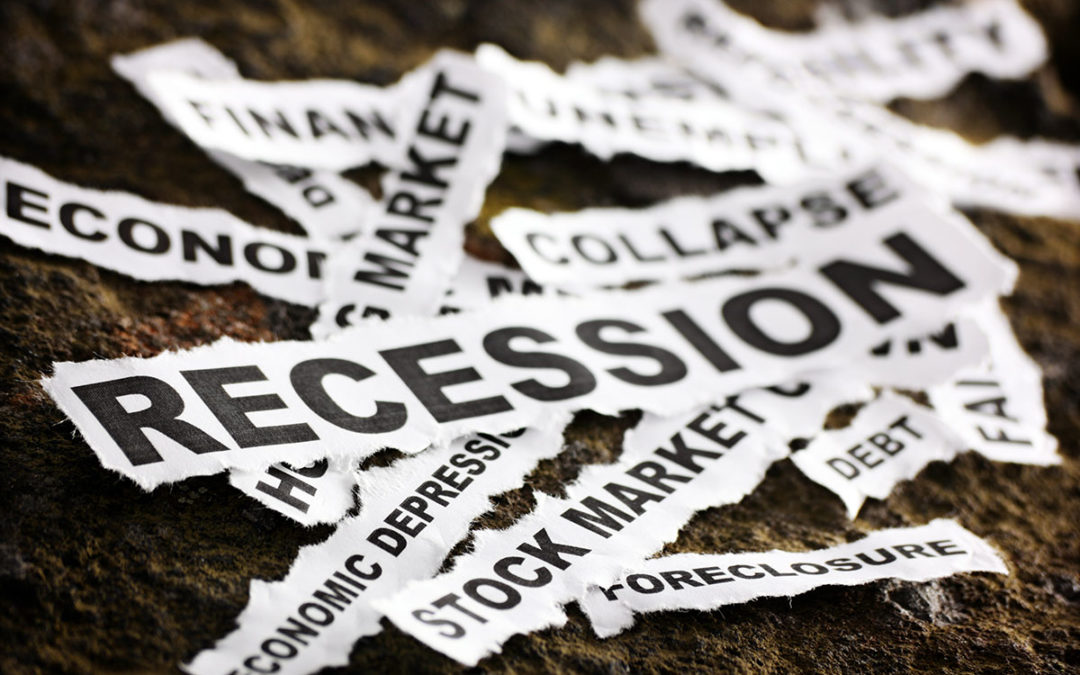Americans started off the new year on the back of a strong economy, and business owners across the country were able to welcome 2022 with a fair amount of optimism. The Gross Domestic Product (GDP) numbers are healthy (if not necessarily spectacular), the unemployment rate is the lowest it’s been in decades, and last year saw the stock market enjoy an unprecedented succession of record highs.

Reviewed and revised, November 1, 2024
As we start the new year it’s clear the American economy is on a definite upswing. But just how long will this boom last? After all, It wasn’t that long ago that Americans found themselves mired in one of the worst recessions in history. The economic meltdown of 2007/2008 sent much of the country reeling, and it’s taken more than 10 long years to recover.
What Goes Up Must Come Down
While the economy is currently booming it would be a mistake to forget the lessons of the Great Recession, and an even bigger mistake to assume that the current boom will not, itself, one day go bust. As any economist will tell you markets and economies are cyclical, and sooner or later what goes up will come down. It is not so much a question of will there be another recession, but when. So, while the markets are up and the economy is booming let’s talk about the best ways to prepare your business to survive a future recession.
The Perfect Storm
Even the mildest of recessions is likely to disrupt a business’ cash flow. And in the event of an economic downturn you can expect to experience some or all of the following:
- Sales begin to slow down
- Clients start taking longer to pay-out on invoices
- Clients default on payments altogether
- Suppliers increase product costs
- Suppliers restructure their invoicing and payment terms
To make matters worse, while you’re wrestling with the above, banks will be disinclined to extend loans to their customers – regardless of their financial histories. It’s a perfect storm that can easily cripple a small business.
Build a Cash Reserve
Building up a healthy cash reserve while times are good can go a long way to helping you weather that storm. Admittedly building a strong cash reserve is not easy, but chances are your business won’t survive a recession without one. While the economy is working for you, make an effort to save money in a dedicated bank account or money market fund. Ideally, you want to build up a reserve that can cover at least three months’ worth of expenses. Six months would be better, but three months is the absolute minimum.
Of course, there is a downside to creating a sizable cash reserve. The money you set aside will not be actively working for you, and that can limit the ability to grow your business. It’s a trade-off that every business owner will have to manage on their own terms. That being said, building a strong cash reserve is the most important step you can take in preparing for a future recession.
Secure New Lines of Credit
Businesses aren’t the only ones to feel the pinch during a recession. As the economy slows down banks will begin to cut back on many of their financial services. Consequently it will become harder for business owners to secure new loans or establish new lines of credit. In order to be ready when another recession takes hold, business owners need to think about funding options while the economy is firing on all cylinders.
Opening a new line of credit is one of the best ways to prepare your business for a future recession. During a robust economy banks are more likely to extend credit at affordable rates, and locking into a favorably structured credit line now will give your business added maneuverability during a recession.
When applying for new lines of credit keep one simple rule in mind. You want to secure a credit line that is equivalent to whichever of the following metrics is greater.
- 50% of your inventory costs
- 85% of your accounts receivable
- 10% of your top-line sales
Consolidate Your Debt
When the economy is strong, business owners have a perfect opportunity to address some of their outstanding debt. Now is a good time to assess any short-term debt you may have and consider restructuring it via a 10 year Small Business Administration-backed loan.
Debt consolidation will help you to decrease your monthly payments, which will give you long-term financial flexibility that can pay dividends in the event of a recession. Consolidating your debt, along with securing new lines of credit, will also help you build a stronger credit history and will improve your overall credit rating.
The Small Business Administration is a valuable, if too often underused, resource for entrepreneurs. Now, while times are good, check out what the SBA can do for you and your growing business. The SBA exists to help entrepreneurs succeed in a volatile marketplace, and smart business owners will take advantage of what the SBA has to offer.
Diversify Your Customer Base
Businesses that rely on only a handful of large clients for their success are walking a tightrope at the best of times. Diversification is key to any business’ success, particularly in the face of a recession. Don’t forget, an economic downturn will impact everyone to some degree. A dip in sales is one thing, but if one of your major customers drops out of the picture entirely due to their own struggles during a recession your business will be hard pressed to make up the loss.
While the economy is riding high be proactive. Take action now to diversify your customer base. Use creative marketing strategies to attract new customers to your business, and work to forge new partnerships that will help to support your business in the event of an economic slump.
Now is also a good time to reassess the makeup of your target audience. Remember, a recession will impact different markets in different ways and some clients may be better able to roll with the punches than others. Look for ways to make your products and services attractive to a wider pool of potential customers. For example, businesses linked with healthcare, education and IT can weather a recession much better than those that are strictly in line with retail, food service or entertainment. Work towards building a diverse customer base that includes more recession resistant clients.
Don’t Be Afraid of Another Recession. Be Prepared
The country is currently enjoying a booming economy (or, at least, the closest we’ve experienced in a very long time). However, it would be a mistake to assume that this boom is going to last. The American economy is ever changing, and sooner or later we will see it plateau and begin to slow down.
Economists are already anticipating the next recession, and while no one expects it to be as severe as the last it is foolish to ignore their warnings. Now is the time to prepare for the future, while the economy is strong and your business is thriving.
Don’t let fear of an oncoming recession stop you from taking the necessary steps to safeguard your business. The choices you make now can help you position your business to survive a new recession and emerge on the other side strong and ready to thrive in the next big boom.
Details
Taking Lending to The Next Level
Challenge
Not everyone has a perfect credit history, and yet everyone needs financial help sometimes.
We seek to make it easier for everyone to find the funding options that work, in any situation.
Our challenge is to match you with your best funding options.
Solution
Relying on the partnerships of more than 30 years in financial services, we have answers. Every situation is different, and we don’t treat you like a number – we listen to your needs, and find the right fit for you.
Our solution is to listen to your needs, and custom fit your best possible deals.
Monthly Fundings
50M
Individuals Served
12K
Loans for YOU
Testimonial
“I can’t believe how easy it was to get money from Bizoodle. I appreciate that more than anything, really…”
John Devonshire, Mobile, Alabama
Effective Entrepreneurs Turn Failure into Small Business Success
Self-employment isn't for everyone. Most people are uncomfortable pursuing a professional path paved with personal sacrifice and risk. Motivated...
Track Expenses Now to Save Time (and Money) Later
Financial management is a big feature of self-employment, but not all entrepreneurs get excited about crunching numbers. Finance experts aside, many...
Controlling Cash Flow – Steer Clear of These Common Spending Mistakes
From personnel matters to inventory control, effective small business management crosses multiple disciplines, calling on owners to address various...
Don’t Underestimate the Value of a Food and Beverage Business Plan
Small business planning accounts for all the particulars that make each operation unique. In addition to industry-specific considerations, small...
The Benefits of Content Marketing for Small Businesses
One of the most important jobs facing any online entrepreneur is self-promotion. Naturally, you want to increase public awareness of your company...
Safety in the Workplace – How to Protect Your Business and Your Employees
As a business owner one of your priorities should be creating a safe and secure workplace for your employees. By maintaining a safe workplace you encourage employee loyalty, increase productivity and remove harmful distractions that can adversely impact the success running of your business.
Staffing to Meet Retail Demand
The retail landscape has undergone a pronounced transformation during recent years. A business model once dominated by brick-and-mortar transactions and mail-order fulfillment has dramatically changed in order to accommodate online sales.








